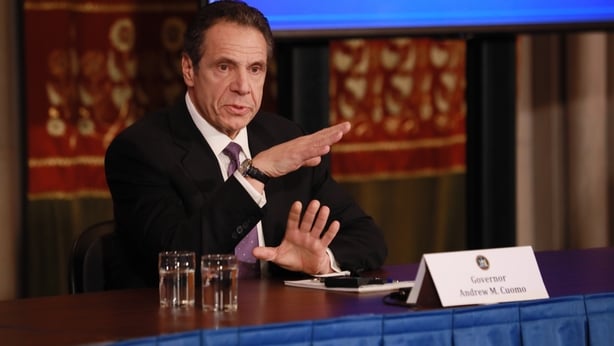US President Donald Trump has said he was suspending immigration for green-card seekers for 60 days, arguing the controversial move would protect US jobs.
Mr Trump offered the first details about a vague announcement on Monday night, addressing an issue key to his conservative base as the country is ravaged by the coronavirus pandemic, with more than 43,000 people dead in the US.
"By pausing immigration, it will help put unemployed Americans first in line for jobs as America reopens," Mr Trump said at his daily pandemic briefing.
He said that the "pause will be in effect for 60 days", adding that he would decide on any extension or changes "based on economic conditions at the time".
The Republican president said the order would "only apply to individuals seeking a permanent residency - in other words, those receiving green cards".
"It will not apply to those entering on a temporary basis," he added.
According to US officials who spoke on condition of anonymity to The Wall Street Journal before Mr Trump spoke, the eventual executive order could include exceptions for farm and health care workers.
The US government issued 462,000 visas in fiscal 2019, according to official data, a major drop from the 617,000 visas granted in 2016 under Mr Trump's predecessor Barack Obama.
Any executive order on immigration will likely spark court action to reverse it, and has already raised hackles among Mr Trump's Democratic opponents.
Elsewhere yesterday, New York Governor Andrew Cuomo pressed Mr Trump for more help from the federal government to carry out coronavirus testing.
It came during a face-to face-meeting he described as cordial and productive after weeks of sometimes nasty exchanges.
Widespread testing is viewed as key to states being able to lift stay-at-home orders and reopen their shuttered economies.
Mr Cuomo said his state, the hardest hit in America by the pandemic, wants to double its daily testing rate quickly.
He said he pressed Mr Trump for the federal government to take control of the supply chain for reagents and other medical equipment to carry out the tests.

The goal is to spare states from bidding against each other on the open market to acquire the material, as they have been doing, or looking abroad to purchase it.
Speaking after his first personal meeting with Mr Trump since the health crisis began, Mr Cuomo acknowledged that the testing itself is the responsibility of individual states.
"But we need help from the federal government to make the supply chain work for the manufacturers, on the reagents, test kits, et cetera, and we said that we'd like to work together in New York state to take our current rate of testing - we do about 20,000 tests a day on average - and double that. Go to 40,000.
"It's a very aggressive goal, and we said that we would work together to meet that goal, so it was a very good conversation," said Mr Cuomo.
Mr Trump's administration is keen to get Americans back to work and has said there are enough tests for each state to move to "phase one" of a gradual reopening, ending some stay-at-home restrictions.
But several US governors have complained about a lack of testing capacity that would allow them to safely begin reopening their states without sparking a surge in infections.
Health experts say a shortage of tests means the United States may be underestimating the extent of the virus outbreak.
New York state is the epicenter of America's coronavirus epidemic, accounting for around a third of the country's deaths.
Meanwhile, one of the US's top health officials has warned that a second wave of coronavirus in the US could be even more destructive because it will likely collide with the beginning of flu season.
Robert Redfield, director of the Centers for Disease Control and Prevention (CDC), called on Americans to use the coming months to prepare and get their flu shots.
"There's a possibility that the assault of the virus on our nation next winter will actually be even more difficult than the one we just went through," he was quoted as saying in an interview with the Washington Post.
"We're going to have the flu epidemic and the coronavirus epidemic at the same time," he said.
The US has recorded more than 800,000 confirmed cases of COVID-19 since the start of the pandemic.

